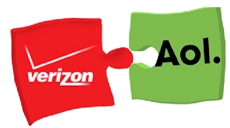Verizon to acquire AOL in $4.4-bn deal
13 May 2015
Verizon is buying AOL in a $4.4-billion deal that would mark the end of the road for a company that was once one of the leading tech stars.
 Verizon will pay $50 per share - a premium of 17.4-per cent to AOL's Monday close. AOL shares jumped 18.4 per cent to $50.41, while Dow Jones industrials component Verizon dipped 0.4 per cent to $49.63.and expects to fund the transaction from cash on hand and commercial paper.
Verizon will pay $50 per share - a premium of 17.4-per cent to AOL's Monday close. AOL shares jumped 18.4 per cent to $50.41, while Dow Jones industrials component Verizon dipped 0.4 per cent to $49.63.and expects to fund the transaction from cash on hand and commercial paper.
The transaction will take the form of a tender offer followed by a merger, with AOL becoming a wholly-owned subsidiary of Verizon upon completion.
Verizon's acquisition is in pursuance of its LTE wireless video and over-the-top video (OTT) strategy.
The agreement will also support and connect to Verizon's IoT (Internet of Things) platforms, creating a growth platform from wireless to IoT for consumers and businesses, Verizon said in a statement.
AOL is a leader in the digital content and advertising platforms segment, and the combination of Verizon and AOL creates a scaled, mobile-first platform offering directly targeted at what eMarketer estimates is a nearly $600 billion global advertising industry.
AOL's key assets include its subscription business; its premium portfolio of global content brands, including The Huffington Post, TechCrunch, Engadget, Makers and AOL.com, as well as its millennial-focused OTT, Emmy-nominated original video content; and its programmatic advertising platforms.
Lowell McAdam, Verizon chairman and CEO, said, ''Verizon's vision is to provide customers with a premium digital experience based on a global multiscreen network platform. This acquisition supports our strategy to provide a cross-screen connection for consumers, creators and advertisers to deliver that premium customer experience.''
Tim Armstrong, AOL chairman and CEO, will continue to lead AOL operations after closing.
A pioneering internet venture, AOL, which was then known as America Online, counted 26 million US subscribers for dial up internet. The company came to define its presence by the phrase "You've Got Mail," which also was the name of a popular movie at the time.
It emerged as one of the world's most powerful corporations stitching up a deal to acquire Time Warner -- one of the largest deals in corporate history in 2001.
AFP quoted Roger Kay, analyst at Endpoint Technologies Associates as saying "a one point AOL" was king of the world on the internet. He added now it was basically an also-ran, adding this was a fire sale for AOL.
The company's decline started shortly after the merger which created a conglomerate known as AOL Time Warner.
Customers started moving to high-speed connections from cable firms, and from the limited content on AOL to the much wider universe of the World Wide Web.
Though the Time Warner merger was touted as a way to bring together the considerable content of Time Warner with the emerging online world, it turned out to be the biggest merger disasters on record.
AOL boosted its content, acquiring a clutch of news sites like the Huffington Post, in 2011, and TechCrunch in 2010, as also other services such as Moviefone and Mapquest.
AOL and its properties, including the Huffington Post, TechCrunch and Engadget websites, would become a Verizon subsidiary, with AOL chief executive officer Tim Armstrong continuing in his job.
According to Armstrong, who is looking to build AOL's expertise in technology for placing text and video ads on mobile phones, mobile would come to represent 80 per cent of media consumption in coming years.
''If we are going to lead, we need to lead in mobile,'' Armstrong said in a memo to employees on Tuesday.
Global revenue from online video ads is projected at $19 billion by 2017 from about $11 billion last year, eating into television ad revenue, research firm IHS said.
Verizon counts over 100 million mobile consumers, and has deals with the likes of the National Football League and ''a meaningful strategy'' in mobile video, according to Armstrong.
''AOL's ad-tech offering has been driving its growth for some time now as the Internet business has faded,'' Dan Ridsdale, an analyst at Edison Investment Research, said in a note to clients. ''This acquisition is aimed at enabling Verizon to maximise its revenues from mobile video.''




















